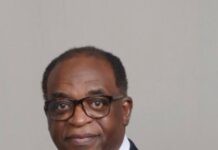 Africa and Latin America have been transforming Christianity at the world level by the way in which they are generating the multiplication of Pentecostal churches and massively converting people to this “new” faith. The word new came to my mind because I have serious problems understanding the new Christian message, maybe because of my background. I am a member of the Anglican Communion, and even within that, part of the Hausa/Fulani tendency which was established by Reverend Walter Miller and his sister, Ethel Miller early in the 20th century. Miller had gone to Tripoli in1898 to learn the Hausa language and he and his sister committed their lives to conversion of the Hausa people to Christianity. He converted both my father, in Kano, and my mother whose family house in “Durumin Mai Garke” was just opposite the CMS Mission in Zaria city to Christianity.
Africa and Latin America have been transforming Christianity at the world level by the way in which they are generating the multiplication of Pentecostal churches and massively converting people to this “new” faith. The word new came to my mind because I have serious problems understanding the new Christian message, maybe because of my background. I am a member of the Anglican Communion, and even within that, part of the Hausa/Fulani tendency which was established by Reverend Walter Miller and his sister, Ethel Miller early in the 20th century. Miller had gone to Tripoli in1898 to learn the Hausa language and he and his sister committed their lives to conversion of the Hausa people to Christianity. He converted both my father, in Kano, and my mother whose family house in “Durumin Mai Garke” was just opposite the CMS Mission in Zaria city to Christianity.
The Christianity we were brought up in was ascetic and defined wealth in narrow and specific terms as salvation and paradise after death. Life was defined as an opportunity to serve and do good and poverty was considered an opportunity to prepare oneself for service. Material wealth was despised after all; Christianity teaches that it’s almost impossible for the wealthy to get to the kingdom of God. Our legendary pastor at Hausa Christ Church Fagge, the late Reverend Jiya, had one key word in terms of our future – salvation. I attended the Sudan Interior Mission primary school in Kano and they were even more committed to preparing members for a life of poverty and service than the Hausa Anglicans. These biographical notes are a preamble to explaining that personally I have great difficulties associating the Pentecostal message with Christianity. My problem is that these churches have an excessive focus on money, money and more money.
The British Guardian (16/8/2013) has a story about the monies collected by Bishop Oyedipo’s Winner’s Chapel. They explain that between 2008 and 2011, the Church had collected 16 million pounds from its members and one million pound from this amount has been set back to the Nigerian headquarters as gifts. Most of the money was paid with Church credit cards carrying the inscription “God loveth a cheerful giver”, which is a citation from the Bible. The British, maybe because of the low level of their spirituality believe that God’s money are spent by human beings and they have got the Charities Commission, the equivalent of our Corporate Affairs Commission to investigate the Church. For them, a Church is a charitable trust and its monies must not be spent in a profligate and non-transparent manner.
The British Guardian of 11th April 2009 had also carried an investigative story on Pastor Matthew Ashimolowo’s Pentecostal church – Kingsway International Christian Centre, in Walthamstow, London. The story explained that the Church had filed company accounts which reveal it made a £4.9m profit over the 18 months and had assets of £22.9m – more than three times the amount held by the foundation which maintains St Paul’s Anglican Cathedral in London. Pastor Ashimolowo at that time earned a salary of £100,000 a year
While the oga at the top of my own church, the Archbishop of Canterbury only earned £68,740 a year. The Guardian story pointed out that in the 18-month period, Ashimilowo collected £9.5m in tithes and offerings while the Church of England collected only £33,000 gave over the same period.
The church was investigated in 2005 by Charity Commission investigators for financial irregularities and Ashimolowo was ordered to repay £200,000 after it emerged that he used church assets to buy a £13,000 Florida timeshare and £120,000 on his birthday celebrations, including £80,000 on a car. New trustees were appointed and Ashimolowo was removed from his role as chief executive. He went back to Nigeria and from concordant reports; God continues to bless him with more money.
The Pentecostelist churches strongly believe in the gospel of prosperity. They train their members about self-development, about becoming financially independent, owning a house, getting a degree and a better job, which I believe is good. What I have problem with is why church members, most of whom are very poor have to give so much to their “widow’s mite” to the church hierarchy. I also don’t understand appeals to the super rich.
Last week, another Pentecostal preacher, Pastor Adeboye announced that “We need N1 Billion from ten people, If you are one of them, please see my personal Secretary after we finish today. We also need N100 million from those who can afford it, if you are in that category, please see my personal Secretary as well….” This was at the 61st Annual Convention of the Redeemed Christian Church of God (RCCG). The money is to enable the church to build a new auditorium, stretching 3 km in length and width at its headquarters on the Lagos-Ibadan expressway. I shudder to think what Pastor Jiya will think of people who can donate one billion naira to the church. Where is the money from, are these the types of people churches should be soliciting money from?
I suspect that casually asking ten people to hand over a billion Naira each to somebody’s secretary would raise questions anywhere in the world. Maybe we should learn from the United Kingdom and get the Corporate Affairs Commission to start asking questions. And maybe, the EFCC and the ICPC may also have questions to ask?
In the past week also, it has been reported that Cameroon’s President, Paul Biya had ordered the closure of nearly 100 Christian churches, most of them Pentecostal. The reports indicate that Biya used the military to permanently shut down all Pentecostal church denominations in the nation’s capital, Yaoundé, and the North West Regional capital, Bamenda, which have the largest Christian populations in Cameroon. The action followed the death of a 9-year-old girl who collapsed and died during a prayer session in Winners’ Chapel, a Pentecostal church in Bamenda. This happened during the process of casting out demons that were said to have taken over the girl.
The problem of money is therefore not the only one affecting the dynamics of some of these churches. Many churches refuse medical treatment and insist that prayers alone can cure all ills. So many are dying due to untreated medical conditions that could have been solved. Families are breaking as spouses are instigated to leave their families on suspicion of being demon carriers and children are accused of witchcraft and some of the killed.
I will certainly not support the prohibition of churches but the reality on the ground is that so much is happening in this arena, which has remained outside the regulatory sphere, and the state needs to start asking questions. Meanwhile, each year, my own Anglican Communion is dwindling as more and more members leave to join the Pentecostelists and this reality must be factored into the equation. This means that the message of these churches resonate with Nigerians. Was it not the late Reverend Jiya who told me decades ago that end times would be interesting times?


